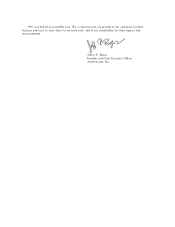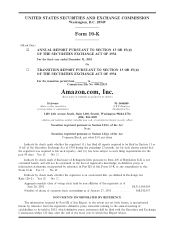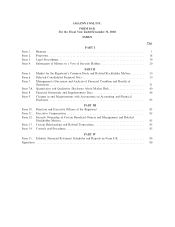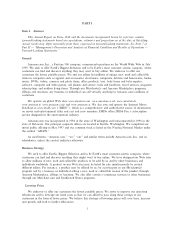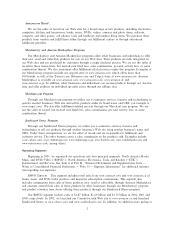Amazon.com 2002 Annual Report Download - page 17
Download and view the complete annual report
Please find page 17 of the 2002 Amazon.com annual report below. You can navigate through the pages in the report by either clicking on the pages listed below, or by using the keyword search tool below to find specific information within the annual report.Our Investments and the Consideration We Receive under Certain Commercial Agreements May Subject
Us to a Number of Risks
In the past, we have entered into commercial agreements with other companies, including strategic
alliances where we perform certain e-commerce services, and in exchange for our services we received
cash, equity securities of these companies, and/or additional beneÑts, such as Web site traÇc. The amount
of compensation we receive under certain of these agreements is dependent on the volume of sales made
by the other company. In some cases, we have also made separate investments in the other company by
making a cash payment in exchange for equity securities of that company. We may in the future make
additional investments in companies with which we already have commercial agreements or companies
with which we enter into new commercial agreements or similar arrangements. To the extent we have
received equity securities as compensation, Öuctuations in the value of such securities will aÅect our
ultimate realization of amounts we have received as compensation for services.
In the past, we amended several of our commercial agreements to reduce future cash proceeds to be
received by us, shorten the term of our commercial agreements, or both. We may in the future enter into
further amendments of our commercial agreements. Although these amendments did not aÅect the
amount of unearned revenue previously recorded by us (if any), the timing of revenue recognition of these
recorded unearned amounts has been changed to correspond with the terms of the amended agreements.
To the extent we believe any such amendments cause or may cause the compensation to be received under
an agreement to no longer be Ñxed or determinable, we limit our revenue recognition to amounts received,
excluding any future amounts not deemed Ñxed or determinable. As future amounts are subsequently
received, such amounts are incorporated into our revenue recognition over the remaining term of the
agreement.
Our investments in equity securities that are not accounted for under the equity method are included
in ""Marketable securities'' and ""Other equity investments'' on our balance sheets. We regularly review all
of our investments in public and private companies for other-than-temporary declines in fair value. When
we determine that the decline in fair value of an investment below our accounting basis is other-than-
temporary, we reduce the carrying value of the securities we hold and record a loss in the amount of any
such decline. In recent years, securities of companies in the Internet and e-commerce industries have
experienced signiÑcant diÇculties. We may conclude in future quarters that the fair values of other of
these investments have experienced an other-than-temporary decline. As of December 31, 2002, our
recorded basis in equity securities was $19 million, including $4 million classiÑed as ""Marketable
securities'' and $15 million classiÑed as ""Other equity investments,'' of which less than $1 million was
accounted for under the equity-method.
The Seasonality of Our Business Places Increased Strain on Our Operations
We expect a disproportionate amount of our net sales to be realized during the fourth quarter of our
Ñscal year. If we do not stock popular products in suÇcient amounts and fail to meet customer demand, it
could signiÑcantly aÅect our revenue and our future growth. If we overstock products, we may be required
to take signiÑcant inventory markdowns or write-oÅs, which could reduce gross proÑts. A failure to
optimize inventory in our fulÑllment network will harm our shipping margins by requiring us to make
partial shipments from one or more locations. We may experience a decline in our shipping margins due to
complimentary upgrades, split-shipments and additional long-zone shipments necessary to ensure timely
delivery, especially for the holiday season. If the other businesses on whose behalf we perform inventory
fulÑllment services deliver product to our fulÑllment centers in excess of forecasts, we may be unable to
secure suÇcient storage space and may be unable to optimize our fulÑllment centers. If too many
customers access our Web sites within a short period of time due to increased holiday or other demand,
we may experience system interruptions that make our Web sites unavailable or prevent us from eÇciently
fulÑlling orders, which may reduce the volume of goods we sell and the attractiveness of our products and
services. In addition, we may be unable to adequately staÅ our fulÑllment centers during these peak
periods and third parties that provide fulÑllment services to our customers may be unable to meet the
8


